Forcibly silent majority in Persian Gulf region strongly condemns any normalization with Israel
A powerfully “silent majority” is strongly rejecting any ties, whatsoever, between the Arab states in the Persian Gulf region and Israel, days after a much-condemned normalization deal between Israel and the United Arab Emirates (UAE).
Abu Dhabi and Tel Aviv announced on August 13 that they had reached such an agreement that would lead to a full normalization of diplomatic relations between the two sides.
The highly controversial deal, which has since been widely condemned across the occupied Palestinian territories and the Muslim world, was brokered by US President Donald Trump, who has attempted to paint it as a big breakthrough.
The UAE-Israel deal marks the third such normalization agreement the occupying regime has struck with an Arab country after Egypt (1979) and Jordan (1994). Abu Dhabi was already believed to have clandestine relations with Tel Aviv.
Furthermore, the Sudanese Foreign Ministry Spokesperson Haidar Badawi Sadiq revealed on Tuesday, in an interview with Sky News Arabic that coup-hit Sudan was trying to follow the same path that led the UAE to a normalization pact with the Israeli regime, saying “there is no reason for the hostility to continue between Sudan and Israel.”
He went on to say that his respective ministry “does not deny the existence of communication between the two” sides.
Israeli prime minister Benjamin Netanyahu was quick to express his enthusiasm upon hearing Sadiq’s promising remarks, saying Tel Aviv would “do everything to make this vision a reality.”
لاحقا للقاء رئيس الوزراء نتنياهو مع رئيس المجلس السيادي السوداني الفريق أول عبد الفتاح البرهان، يرحب رئيس الوزراء نتنياهو بموقف وزارة الخارجية السودانية الذي يعكس القرار الشجاع الذي اتخذه رئيس مجلس السيادة السوداني والذي دعا للعمل على تعزيز العلاقات بين البلدين.
— بنيامين نتنياهو (@Israelipm_ar) August 18, 2020
Reports said on Saturday that Israel’s Mossad head Yossi Cohen met with the deputy chairman of the Sudanese Sovereign Council, General Mohamed Hamdan Dagalo in a meeting mediated by UAE officials. Sudan has denied the report of the meeting.
Cohen, last week, paid a visit to the UAE and meet with his counterpart, Tahnoun bin Mohammed Al Nahyan, the national security adviser of the UAE and the son of the country’s founder.
It was the first public visit by an Israeli official since the announcement of the so-called agreement.
Although Sadiq was relieved from his duties over “unauthorized” comments about a possible Sudan-Israel agreement, Khartoum has already been in the same race with certain Persian Gulf states to embrace the occupying entity.
Earlier this year, Abdel Fattah al-Burhan, the head of Sudan’s transitional government, met with Netanyahu in Uganda, and the clandestine relations between Tel Aviv and Khartoum can also be traced back to the 1950s, as Columbia University Professor Joseph Massad has already noted.
Silent majority against normalizing ties with Israel
The developments come as civil society groups and unions in the Persian Gulf states and North African countries are voicing their strong opposition against any normalizing relations with Israel.
Qatar
Two days after the announcement of the Israel-UAE agreement, the Persian Gulf Coalition Against Normalization, which is a Qatari activist group, strongly lambasted the condemned deal, stressing that it “went beyond normalization into an alliance with the Zionist enemy.”
The coalition emphasized that the agreement would not “deter the people of the Persian Gulf from standing with Palestinian rights”, which the group called the “forcibly silent majority.”
It also urged citizens to “to stand against Persian Gulf normalization at all levels and publicly denounce it and reject all justifications for it.”
Separately, another activist group, known as Qatar Youth Opposed to Normalization, called for a unified stance against Israel-UAE agreement.
Qatar has been under a blockade, since June 2017, by Egypt and three Persian Gulf states, namely the UAE, Saudi Arabia and Bahrain the allegations of meddling in regional affairs and supporting “terrorism.”
Riyadh, which led the quartet states in isolating Doha, is believed to have overt relations with Tel Aviv.
“We are aware of the existence of a silent majority that rejects this humiliation and disgrace,” the Qatar Youth Opposed to Normalization said on Tuesday.
It also reaffirmed that “attacking Palestine means attacking Arab existence, and defending it means defending that very existence.”
Bahrain
On Friday, the Bahraini Society Against Normalization with the Zionist Enemy, which is composed of eight parties, also called on Manama to adopt a firm position against normalization ties with Tel Aviv.
It stressed in its statement that steps toward recognizing the occupying entity “have always increased its arrogance and aggression against Palestinians.”
نؤكد موقفنا الثابت و مواقف احرار العالم المؤيدة لحقوق الشعب الفلسطيني الثابتة والمقاومة للتطبيع بكافة أشكاله الرياضية والثقافية والأكاديمية والتجارية والصناعية وجميع المساهمين فيها.
— الجمعية البحرينية لمقاومة التطبيع (@bsaz_bh) August 15, 2020
#BDS #Bahrain #البحرين pic.twitter.com/U263h63noE
The coalition, which includes Muslim and progressive political parties, urged Manama to affirm its rejection of normalization in line with the popular position already adopted by citizens of the tiny Persian Gulf country.
Kuwait
A number of trade unions and student groups in Kuwait also issued similar statements in condemning normalization.
Fourteen student groups, including the university student union, called on Kuwait’s 65-seat National Assembly – the parliament - to outlaw normalization with the Israeli regime.
بيان القوى الطلابية الكويتية
— اتحاد طلبة جامعة الكويت (@NUKSku) August 18, 2020
بشأن التطبيع مع الكيان الصهيوني
ودعوة لمجلس الأمة الكويتي لتشريع قانون يجرم التطبيع بكافة اشكالة.#لا_للتطبيع#التطبيع_خيانة pic.twitter.com/szH7GgMbTH
Furthermore, 37 members of the parliament signed a joint letter reaffirming their opposition to ties with Israel.
بيان مشترك للقوى #الطلابية الكويتية
— BDS Kuwait حركة (@BDS_Kuwait) August 18, 2020
14 كياناً طلابياً كويتياً يصدرون بياناً يستنكرون فيه التطبيع مع الكيان الصهيوني الغاصب ويدعون لتشريع قانون يجرم التطبيع#الكويت_تقاطع#كويتيون_ضد_التطبيع pic.twitter.com/RmzUurclxM
“The public will not accept any retreat from the government’s commitment to the primary Arab and Muslim cause,” the legislators said.
4. Public Intellectuals:
— Elham Fakhro (@elhamfakhro) August 16, 2020
Oman- statement by a group of 25 Omani public intellectuals calling for governments to respect the will of their people.
Kuwait- statement by group of public figures declaring they stand by Kuwaits civil society in support for Palestinians pic.twitter.com/UKpx5gPCTd
The Kuwaiti lawmakers also stressed that the “crimes of the occupation cannot be removed from the souls of our people.”
Among the Arab states of the Persian Gulf region, Kuwait has long resisted the trend toward normalization with Israel pursued by its neighbors.
37 نائباً في #مجلس_الأمة_الكويتي يصدرون بياناً بشأن جريمة التطبيع مع العدو الصهيوني
— BDS Kuwait حركة (@BDS_Kuwait) August 18, 2020
ويؤكدون على موقف #الكويت الثابت بمناهضة التطبيع مع الكيان الصهيوني المحتل#الكويت_تقاطع#كويتيون_ضد_التطبيع pic.twitter.com/zrZIvIzmms
Meanwhile, activists, intellectuals and cultural figures across the Persian Gulf region have also expressed their rejection of the deal.
Activist slams Israel for bedeviling Palestinian cartoonist over critical UAE cartoon
Rima Najjar, a Palestinian social media activists has taken to task a former Israeli government advisor for trying to bedevil a Palestinian activist over his critical cartoon about a deal between Tel Aviv and Abu Dhabi to improve the two side’s relations.
Mohammad Sabaaneh is a Palestinian activist, who has likened the Emirati rulers to toilet paper in a poignant cartoon after Abu Dhabi announced its decision to clinch a deal with Tel Aviv with the goal of totally normalizing ties with the occupying regime.
Inciting The #Gulf Public On Twitter Against ##Palestinian #Cartoonist #MohammadSabaaneh #UAE #Palestine https://t.co/C7dIFKfOwK
— Mohammad Sabaaneh (@Sabaaneh) August 20, 2020
Later on, Edi Cohan, a former Israeli government advisor who introduces himself as “chief executive officer at Bar-Ilan University International School,” initiated a trolling campaign against award-winning Palestinian political cartoonist Sabaaneh based on his cartoon of the UAE’s Crown Prince Mohammad Bin Zayed as a toilet paper roll.
Edy Cohen retweeted Sabaaneh’s cartoon of the ruler of UAE as a toilet paper roll precisely in order to kindle fires of hateful and frenzied insults in response to the cartoonist’s depiction. Here is my translation of Cohen’s comment, which he wrote in Arabic.
"A Palestinian cartoonist abuses and curses [Persian] Gulf rulers. These cartoonists are scared to draw Netanyahu, because he could deny their entry to Israel. This, notwithstanding that the biggest Palestinian community [in exile] in the world is to be found in Saudi Arabia and then in the Emirates. How weird you are Palestinians [to bite the hand that feeds you]."
.@EdyCohen, SHAME! @Sabaaneh, like Dhabiya Khamis @dhabiya1, is inviting us to connect the dots and call for a free & Arab Palestine. He is not insulting the Emirati people any more than a critical Trump cartoon insults Americans
— Rima Najjar (@rima123) August 20, 2020
Long live all Arabs free!https://t.co/VYhLnjdj8n
Mohammad Sabaaneh responded to Cohen’s incitement against the cartoon on his own Facebook page with: “One feels as though Edy Cohen represents public opinion in the [Persian] Gulf … He incites against one of my cartoons and so begins on Twitter a trolling campaign on my page. Anyone interested in attending the wedding [the trolling exercise], click on https://twitter.com/Sabaaneh/status/1296058521889447938?s=09.
The full text of the Najjar's article is available at the following address:
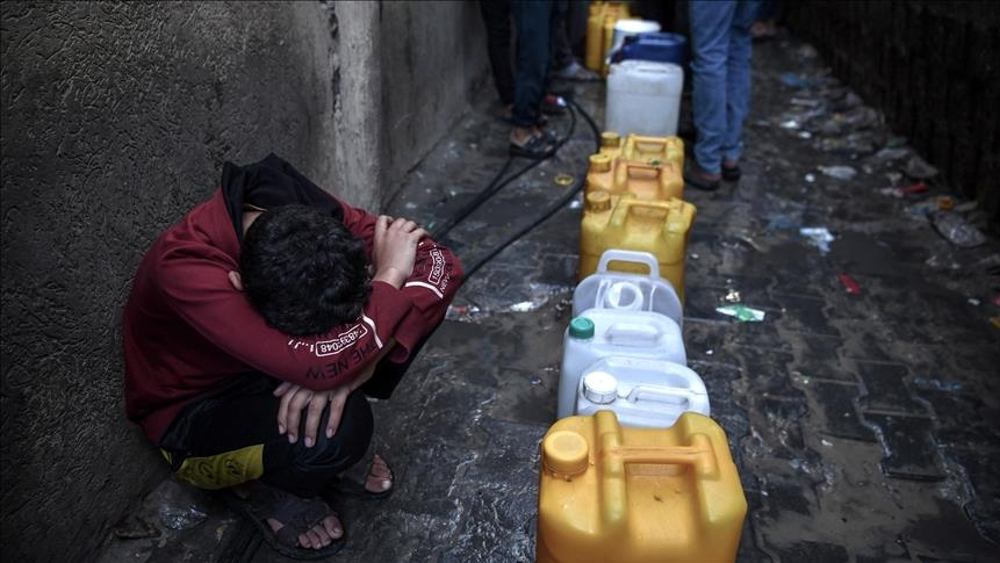
‘Full-blown crisis’: Gaza municipality warns as Israel cuts 70% of water supply
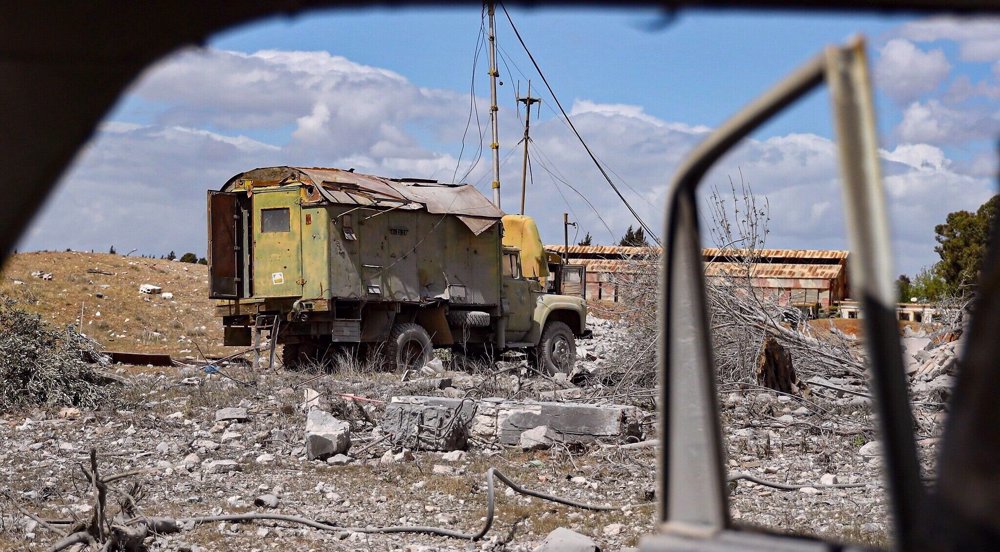
Israel claims it destroyed former military site in southern Syria
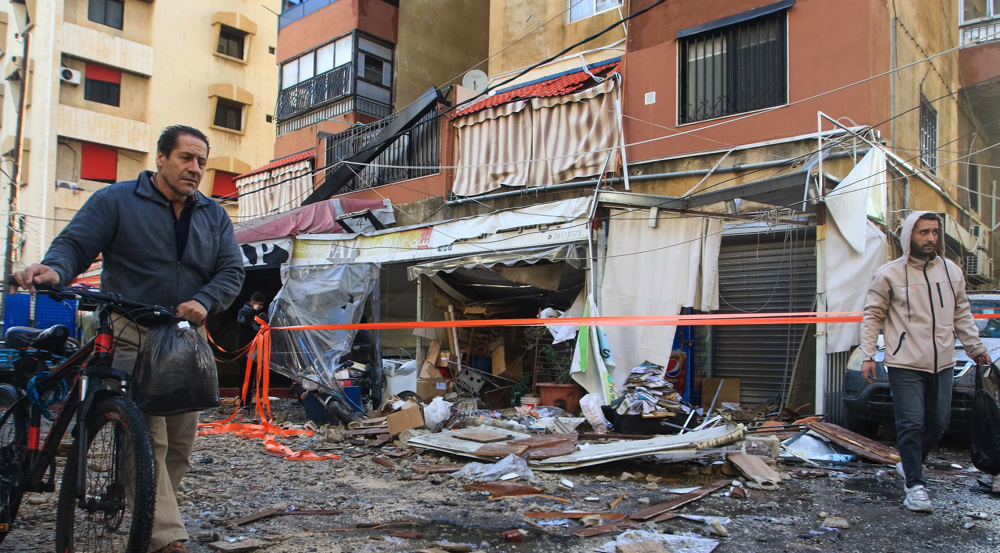
Israel trying to destabilize Lebanon, Syria through military provocations: Arab League chief
‘Full-blown crisis’: Gaza municipality warns as Israel cuts 70% of water supply
Italians against ReArm Europe
Trump's war rhetoric against Iran to impose heavy costs on US and allies: Analyst
United in defense: Iranian civil activists warn US against war
Yemen conducts fresh operation against US warships in Red Sea
VIDEO | ‘Hands off!’ rallies sweep across US: Thousands assail Trump and Musk
VIDEO | Tens of thousands stage protest against EU's rearmament plan in Rome
VIDEO | Israel plans to erase Palestinian refugee camps, right to return


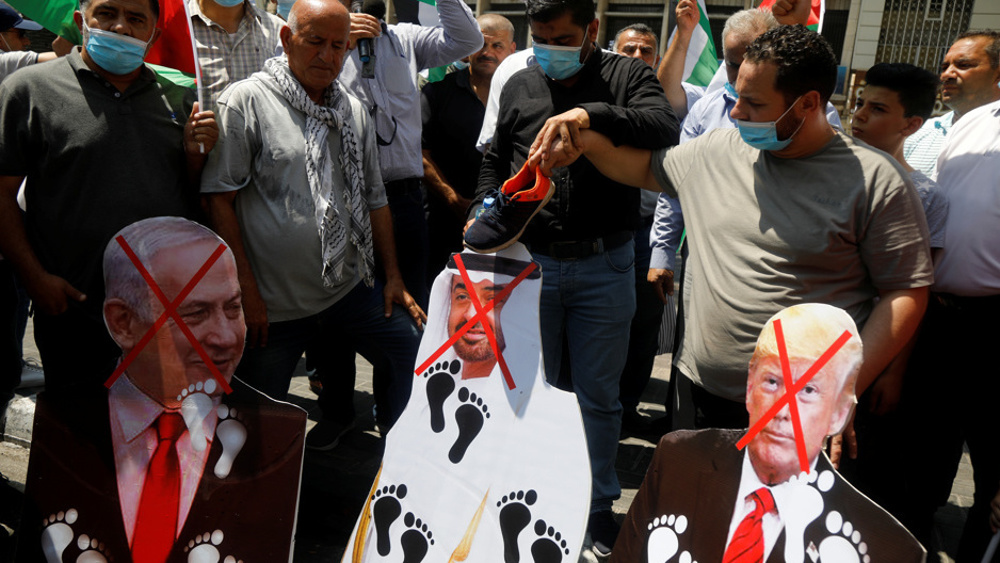



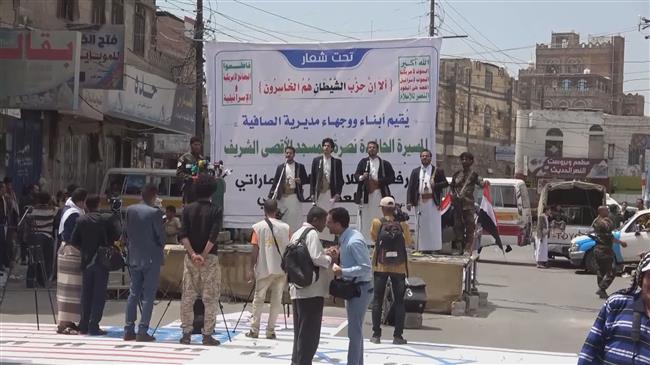





 This makes it easy to access the Press TV website
This makes it easy to access the Press TV website